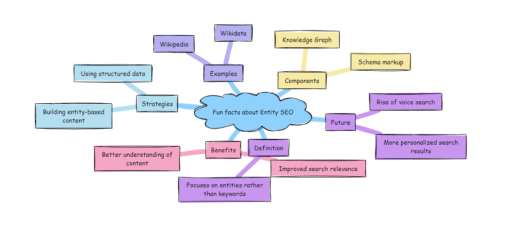Introduction to Entities in SEO

Entities in SEO are fundamental elements that help search engines understand and rank content. They matter because they provide a deeper understanding of the content’s context, improving search accuracy and user experience.
What are entities in SEO, and why do they matter?
Entities in SEO are distinct objects or concepts that search engines can recognize and understand. They matter because they enhance the relevance and accuracy of search results by providing context.
What is the difference between keywords and entities?
Keywords are specific words or phrases users type into search engines. Entities are broader concepts or objects encompassing keywords, providing context and meaning.
What is semantic SEO?
Semantic SEO improves search accuracy by understanding the searcher’s intent and the contextual meaning of terms within the query.
What is an entity in SEO?
An entity in SEO is a distinct, identifiable object or concept that search engines recognize and understand.
What is an entity in simple words?
An entity has a distinct existence, like a person, place, thing, or idea.
What does entity mean for dummies?
For dummies, an entity is specific and recognizable, like a famous person, a location, or a brand.
Can you give 3 examples of entities?
What is an example of an entity?
An example of an entity is the “Eiffel Tower,” a specific landmark in Paris.
What is a simple example of an entity?
A simple example of an entity is “Barack Obama,” a specific individual who was the 44th President of the United States.
Types and Categories of Entities
What are the two different types of entities?
The two different types of entities are named entities and numeric entities. Named entities refer to specific names of people, places, organizations, etc., while numeric entities refer to measurable quantities like dates and monetary values.
What are the three main types of entities?
The three main types of entities are person, place, and organization. These categories cover the most recognizable and significant entities in SEO.
What are the five categories of entities?
The five categories of entities are person, place, organization, event, and work of art. These categories help organize and understand various entities better.
What are the 5 entity types?
The five entity types are:
- Person
- Place
- Organization
- Event
- Work of Art
Can an entity have two words?
An entity can have two or more words, such as “New York City” or “Bill Gates.”
What is the difference between an entity and an attribute?
An entity is a distinct object or concept, while an attribute is a property or characteristic of that entity. For example, in “Barack Obama,” the entity is “Barack Obama,” an attribute could be his birth date or occupation.
What is considered an entity?
An entity is considered anything with a distinct and identifiable existence, such as a person, place, thing, event, or concept.
What is an entity set example?
An example of an entity set is “Students” in a school database, where each student is an individual entity within this set.
Importance and Use of Entities
What is the use of entities?
Entities provide context and meaning to content, improving search engine understanding and enhancing search result relevance.
Why create an entity?
Creating an entity helps define and identify specific objects or concepts, making it easier for search engines to categorize and index information.
Why is it important to have entities?
Entities are vital because they improve the accuracy and relevance of search results, enhance user experience, and facilitate better content organization and retrieval.
What can an entity do?
An entity can represent specific objects or concepts, providing context and aiding in the categorization, indexing, and retrieval of information by search engines.
What is the role of an entity?
The role of an entity is to serve as a distinct, identifiable object or concept that helps search engines understand the content’s context and relevance.
What is the function of an entity?
The function of an entity is to provide a clear and precise meaning to content, enabling search engines to deliver more accurate and relevant search results.
What makes a good entity?
A good entity is distinct, easily recognizable, and unambiguous, providing clear context and meaning to its content.
What is an example of a strong entity?
An example of a strong entity is “Google,” a distinct and well-recognized brand representing a specific organization.
Entities in Web and SEO Context
What is an entity on a website?
An entity on a website is a specific, identifiable object or concept represented in the content, such as a person, place, organization, or product.
How do you use entities in SEO?
In SEO, entities improve content relevance and search engine understanding. This involves incorporating identifiable entities in the content, using structured data to mark up entities, and ensuring the context is clear.
How do you identify entities?
Entities can be identified through natural language processing tools, semantic analysis, and by recognizing specific names, places, organizations, and other objects within the content.
What are entities in semantic SEO?
Entities in semantic SEO refer to specific objects or concepts that provide context and meaning, helping search engines understand the relationships and relevance of the content beyond just keywords.
What is the use of @entity?
In programming and database contexts, @entity defines a class as an entity in frameworks like Java’s Hibernate, indicating that the class maps to a database table.
What is the difference between @entity and @table?
@entity marks a class as a persistent entity, while @table specifies the database table name to which the entity should be mapped. @entity focuses on the object representation, and @table on the database structure.
What are HTML entities?
HTML entities are special codes used to represent characters in HTML that have reserved meanings, such as & for “&” or < for “<, “ensuring these characters are displayed correctly in web browsers.
Entity Optimization for SEO
How do we optimize for entities?
To optimize for entities, ensure your content defines and contextualizes specific objects or concepts. Use structured data markup like schema.org to help search engines understand the entities. Additionally, build authoritative content around these entities and acquire relevant backlinks.
How to optimize for entity SEO?
Optimizing for entity SEO involves incorporating structured data, creating comprehensive content that thoroughly covers the entity, using relevant keywords naturally, and ensuring that the content provides clear and useful information about the entity. Building a robust link profile with authoritative sources referencing the entity also helps.
How do I find SEO entities?
SEO entities can be found using tools like Google’s Knowledge Graph, natural language processing tools, and keyword research tools highlighting entities related to your content. Analyzing top-performing content in your niche can also help identify essential entities.
What is entity match in SEO?
Entity match in SEO refers to the alignment between the entities identified in your content and those recognized by search engines. A strong entity match improves the relevance and ranking of your content by ensuring that search engines accurately understand and index your content.
What is the difference between topics and entities?
Topics are broad subjects or themes that content can be about, while entities are specific, identifiable objects or concepts within those topics. For example, a topic could be “climate change,” and entities within that topic could include “carbon dioxide,” “global warming,” and “Paris Agreement.” Entities provide specific context and detail to topics.
Entity Linking
What is entity linking in SEO?
Entity linking in SEO connects mentions of entities in your content to their corresponding entries in databases like Google’s Knowledge Graph. This helps search engines understand the context and relationships of the entities.
Why is entity linking important?
Entity linking is important because it enhances search engines’ understanding of your content, improving the accuracy of search results and increasing its visibility. It also helps establish authority and relevance.
Why is entity linking hard?
Entity linking is hard because it requires accurately identifying entities, distinguishing between similar or ambiguous terms, and correctly associating them with their corresponding database entries. This complexity increases with the scale and diversity of the content.
How to do entity linking?
Entity linking can be done by:
- Using structured data and schema markup to tag entities.
- Utilizing natural language processing tools to identify and link entities.
- Manually linking to authoritative sources or databases that clearly define the entities.
- Ensuring clear and consistent use of entities throughout the content.
What is an entity linker?
An entity linker is a tool or system that identifies and associates mentions of entities in the text with their corresponding entries in a database or knowledge graph.
What is the difference between entity matching and entity linking?
Entity matching involves identifying and confirming that two data representations refer to the same entity. Entity linking, conversely, connects mentions of entities in the text to their entries in a knowledge database, focusing on contextual and semantic relationships.
What is entity linking vs resolution?
Entity linking refers to connecting text mentions to a knowledge base, while entity resolution determines and merges different data records representing the same entity across various datasets.
What is an entity resolution algorithm?
An entity resolution algorithm is a computational method for identifying and merging different records that refer to the same entity. These algorithms use various techniques, such as machine learning, rule-based matching, and probabilistic methods, to resolve and unify entity records.
SEO Strategies and Best Practices
What matters most in SEO?
In SEO, relevance, quality content, user experience, and authoritative backlinks matter most. Search engines prioritize content that best matches the user’s query and provides valuable information.
What are the 3 core must-haves of SEO?
The 3 core must-haves of SEO are:
- Quality Content: Engaging, informative, and relevant content.
- Technical Optimization: Proper site structure, fast loading speeds, and mobile-friendliness.
- Backlinks: High-quality links from authoritative websites.
What 4 pillars are essential in SEO?
The 4 pillars important in SEO are:
- Technical SEO: Ensuring your site meets technical requirements for indexing and crawling.
- On-Page SEO: Optimizing content and HTML source code.
- Off-Page SEO: Building backlinks and increasing online authority.
- Content: Creating valuable, relevant, and engaging content.
What is the best structure for SEO?
The best structure for SEO is a clear, hierarchical website structure with a logical flow of categories, subcategories, and pages. Use breadcrumbs, a clean URL structure, and internal linking to guide users and search engines.
What are the top 5 SEO strategies?
The top 5 SEO strategies are:
- Conducting comprehensive keyword research.
- Creating high-quality, relevant content.
- Optimizing on-page elements like titles, meta descriptions, and headers.
- Building authoritative backlinks.
- Ensuring technical SEO is in place, including site speed and mobile optimization.
What are the 3 C’s of SEO?
The 3 C’s of SEO are:
- Content: High-quality and relevant information.
- Code: Clean and efficient HTML/CSS code.
- Credibility: Building authority and trustworthiness through backlinks and user engagement.
What are the 4 P’s of SEO?
The 4 P’s of SEO are:
- Performance: Site speed and technical health.
- Publishing: Regularly producing quality content.
- Promotion: Distributing and promoting content to gain backlinks.
- Planning: Strategizing SEO efforts based on analytics and goals.
How do I organize my SEO content?
Organize your SEO content by:
- Conducting keyword research to understand user intent.
- Creating a content calendar to plan and schedule posts.
- Structuring content hierarchically with categories and subcategories.
- Using internal linking to connect related content.
- Regularly updating and optimizing existing content.
How do you structure your content for SEO?
Structure your content for SEO by:
- Using clear headings (H1, H2, H3) to organize content.
- Including relevant keywords naturally.
- Writing concise and informative meta titles and descriptions.
- Using short paragraphs and bullet points for readability.
- Incorporating images, videos, and other media with alt text.
How do you create an SEO-friendly website structure?
Create an SEO-friendly website structure by:
- Designing a clear hierarchy with categories and subcategories.
- Using descriptive, keyword-rich URLs.
- Implementing breadcrumb navigation.
- Ensuring fast load times and mobile responsiveness.
- Creating an XML sitemap and submitting it to search engines.
Advanced SEO Concepts
What is NLP in SEO?
Natural Language Processing (NLP) in SEO uses computational techniques to understand and analyze the human language used in web content. NLP helps search engines interpret the context, sentiment, and meaning of the content, leading to more accurate and relevant search results. Techniques such as entity recognition, sentiment analysis, and language understanding are integral to NLP in SEO.
What is programmatic SEO?
Programmatic SEO uses automation and large-scale data analysis to create and optimize vast content efficiently. This approach leverages algorithms, APIs, and templates to generate content that targets a wide range of keywords and topics. Programmatic SEO benefits large websites, such as e-commerce sites or content aggregators, aiming to rank for numerous long-tail keywords.
What is parasite SEO?
Parasite SEO is a controversial tactic where a marketer uses the high domain authority of another website to rank content in search engine results. This often involves creating content on highly authoritative platforms, such as social media sites, forums, or blogging platforms, and optimizing it to rank for specific keywords. While it can provide quick results, parasite SEO is often considered a gray-hat or black-hat technique, as it exploits the authority of other sites rather than building one’s own.
Business Entities and SEO
What is the primary reason that entities incorporate?
The primary reason entities incorporate is to provide legal protection for the owners by creating a separate legal entity. Incorporation limits personal liability for business debts and obligations, offers tax benefits, and enhances credibility with customers and investors.
What does incorporating an entity mean?
Incorporating an entity means legally establishing a business as a separate legal entity, such as a corporation or limited liability company (LLC). This process involves filing necessary documents with the state, complying with regulatory requirements, and creating a distinct legal identity for the business.
What is the best entity for a small business?
The best entity for a small business often depends on various factors such as liability protection, tax implications, and management structure. Common choices include:
- Sole Proprietorship: Simplest form but offers no liability protection.
- LLC: Provides liability protection with flexible tax options and minimal administrative requirements.
- S Corporation: Offers liability protection and potential tax benefits but has stricter operational processes.
How do I optimize my business for SEO?
To optimize your business for SEO:
- Conduct thorough keyword research to understand your audience.
- Create high-quality, relevant content that addresses customer needs.
- Optimize on-page elements, including titles, meta descriptions, and headers.
- Ensure your website is mobile-friendly and has fast loading speeds.
- Build backlinks from authoritative websites.
- Utilize local SEO strategies, such as Google My Business, if applicable.
Is SEO worth it for small businesses?
Yes, SEO is worth it for small businesses. It can significantly increase online visibility, drive targeted traffic, and improve brand credibility. SEO helps small businesses compete with larger companies by leveling the playing field in search engine rankings.
What is the difference between an entity and a business?
An entity is a distinct, legally recognized organization, such as a corporation, LLC, or partnership. A business refers to the commercial activities conducted by an entity to earn profit. While all businesses operate as entities, not all entities are businesses; some may be non-profit organizations or government bodies.
What are major entities?
Major entities are large organizations with significant influence and recognition, including multinational corporations, government agencies, and well-known non-profits. Examples include Apple Inc., the United Nations, and the Red Cross.
What are the three types of business entities?
The three types of business entities are:
- Sole Proprietorship: Owned and operated by one individual, without distinction between the owner and the business.
- Partnership: Owned and operated by two or more individuals who share profits and liabilities.
- Corporation: A separate legal entity owned by shareholders, offering limited liability protection and the ability to raise capital through stock issuance.
How do I select a business entity?
To select a business entity, consider the following factors:
- Liability Protection: Determine the level of personal liability protection needed.
- Taxation: Evaluate tax implications and benefits of each entity type.
- Administrative Requirements: Consider the complexity and cost of formation and ongoing compliance.
- Ownership and Management Structure: Decide on the preferred structure for ownership and management.
- Future Needs: Anticipate potential growth and financing needs.
Consulting with legal and financial professionals can also help make an informed decision.
Miscellaneous Entity Info
Why do we use Entity Framework?
We use Entity Framework because it simplifies database interactions in .NET applications. It allows developers to work with data using objects and classes rather than writing complex SQL queries. Entity Framework supports multiple database providers, automates database schema creation and updates, and improves productivity and maintainability by enabling a code-first or model-first approach to database design.
What is the most common type of entity?
The most common type of entity is a “person.” This category encompasses a wide range of individual human beings and is frequently encountered in various data contexts, from business customer records to character references in narratives.
How many types of entities are there?
There are several types of entities, commonly grouped into categories such as:
- Person
- Place
- Organization
- Event
- Work of Art
- Product
- Concept
These categories help organize and understand the diverse range of entities that can be identified and utilized in different contexts, particularly in SEO and data management.

